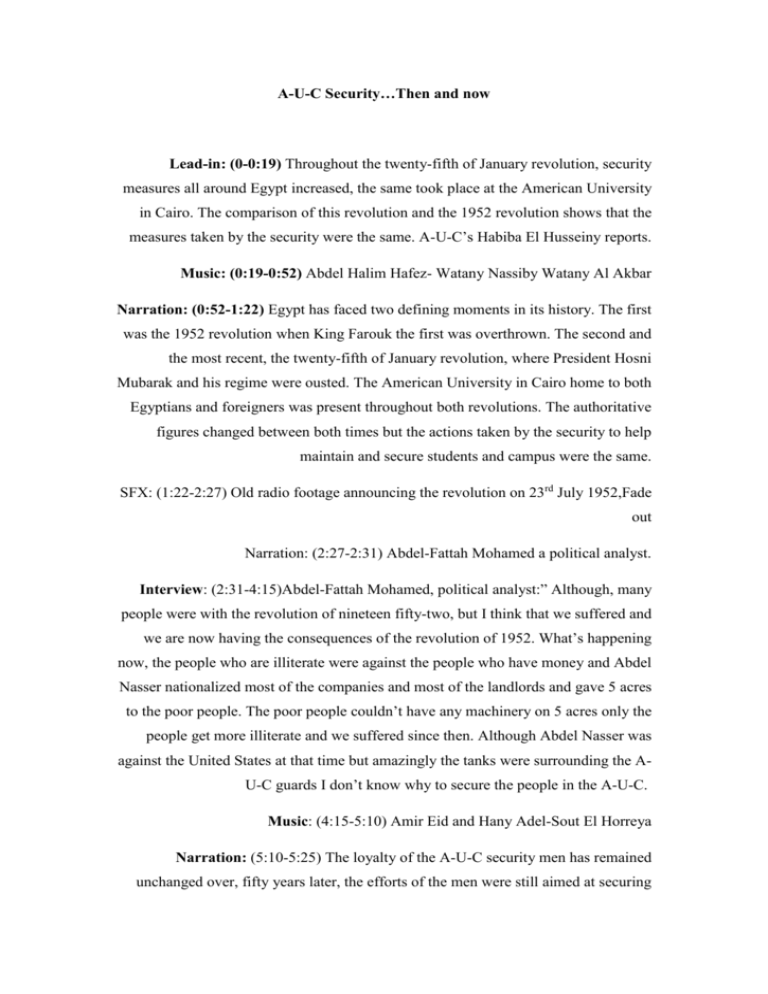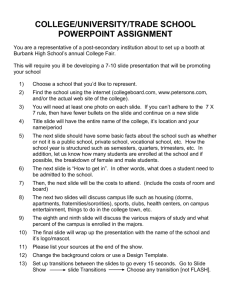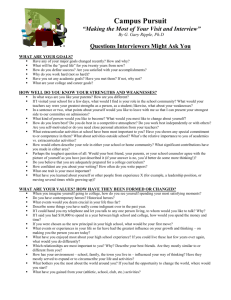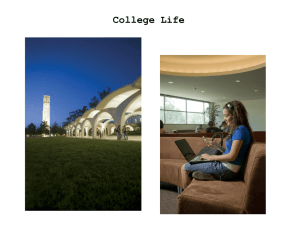View/Open - AUC DAR Home - The American University in Cairo
advertisement

A-U-C Security…Then and now Lead-in: (0-0:19) Throughout the twenty-fifth of January revolution, security measures all around Egypt increased, the same took place at the American University in Cairo. The comparison of this revolution and the 1952 revolution shows that the measures taken by the security were the same. A-U-C’s Habiba El Husseiny reports. Music: (0:19-0:52) Abdel Halim Hafez- Watany Nassiby Watany Al Akbar Narration: (0:52-1:22) Egypt has faced two defining moments in its history. The first was the 1952 revolution when King Farouk the first was overthrown. The second and the most recent, the twenty-fifth of January revolution, where President Hosni Mubarak and his regime were ousted. The American University in Cairo home to both Egyptians and foreigners was present throughout both revolutions. The authoritative figures changed between both times but the actions taken by the security to help maintain and secure students and campus were the same. SFX: (1:22-2:27) Old radio footage announcing the revolution on 23rd July 1952,Fade out Narration: (2:27-2:31) Abdel-Fattah Mohamed a political analyst. Interview: (2:31-4:15)Abdel-Fattah Mohamed, political analyst:” Although, many people were with the revolution of nineteen fifty-two, but I think that we suffered and we are now having the consequences of the revolution of 1952. What’s happening now, the people who are illiterate were against the people who have money and Abdel Nasser nationalized most of the companies and most of the landlords and gave 5 acres to the poor people. The poor people couldn’t have any machinery on 5 acres only the people get more illiterate and we suffered since then. Although Abdel Nasser was against the United States at that time but amazingly the tanks were surrounding the AU-C guards I don’t know why to secure the people in the A-U-C. Music: (4:15-5:10) Amir Eid and Hany Adel-Sout El Horreya Narration: (5:10-5:25) The loyalty of the A-U-C security men has remained unchanged over, fifty years later, the efforts of the men were still aimed at securing the campus and its students. They left everything behind and stayed on campus. Mohamed Salam, a security guard: Interview: Mohamed Salama, security guard, (5:25-5:45)“the orders we got were from our superior officer. We used to stay for twenty-four hour shifts securing the gates. On each gate there was about fifteen to sixteen guards. We combined two shifts together to increase our numbers in case anyone attacked. There was always gunfire around us from the Arabs living in the desert trying to scare the thugs. While we were guarding the campus we could see all the chaos around us. Our families and parents were in danger but we stayed here to secure the university. After all we did only Dr. Lisa came and thanked us, and we all owe her a lot.” Narration: (5:45-5:50) Even though the security guards did have a lot to loose they still stood their ground. Interview: (5:50-6:30)“No thugs came on campus, but we caught one of the thieves just outside campus. He had stolen things from Rehab and other compounds around us and we handed him over to the army. He had stolen things worth thousands of pounds. We had no weapons the only thing we had to protect ourselves were wooden placards. We would have cars patrolling inside and out of campus at all hours. We did not anticipate the unprecedented shut-down of the entire Internet nor the blockage of mobile phone service, Over the weekend and through the early days of the week, the general security situation in the country was quite poor, as the police had withdrawn from most of their posts, police stations burned and prisoners released from jail, at that point we were terrified but nonetheless, we stood our ground.” SFX: (6:30-7:27) chants of protestors in Tahrir (fade out). Narration: (7:27- 8:00)for the students living at the dorms throughout the revolution it was not easy even when many of their foreign friends went back home. Ingy Mostafa, Ingy Mostafa, student at the dorms: (8:00-8:20)Well what they did first was to tell the dorms students that they weren’t allowed to leave after curfew so we were on lockdown on campus. We were very, very safe, I mean I think the A-U-C campus from afar just looks intimidating … security stayed for like twelve-hour shifts at a time. I managed to make friends with the graveyard shift security guards just the second you step outside you feel the chaos but inside it was just quite, there was nothing to do but watch the news and see what is happening in Tahrir. Lisa Anderson came once or twice I think …I think it was just once to tell us that all the dorm students would be moved from the new campus dorms to the Zamalek dorms, because they thought that the one here in Kattameya in New Cairo is too far away and with security being so lass in the country workers and security guards and housekeeping staff and what have you they didn’t feel safe coming all the way to New Cairo just to work. So, they wanted to move us. Narration: (8:20-8:59) A-U-C students who were at the dorms through the revolution felt that they were truly isolated from the outside world, they were only allowed out to buy groceries. Interview: (8:59-11:36) I was home on January twenty-fifth in Alexandria I wasn’t in the dorms I went to the dorms on twenty-seventh. They weren’t happy that I left Alexandria and went to Cairo but I thought school would start on January thirtieth I never thought things would get out of hand the way they did especially on the twentyeighth when we woke up we had no internet no phones nothing and the service point at the dorms was very helpful because parents were calling at the service point twenty-four seven and they were connecting all the calls and were putting all our parents through to us as well. I wouldn’t say the Administration handled it well because, maybe they handled it well in terms of planning but I think it was the staff at A-U-C, the security staff the help the service point the house keeping all of them they did a brilliant job while we were staying in the dorms. A lot of them left but some of them they stayed and they felt that, you know, even if the regime is deposed even if everything went to hell that its Egypt, how bad can things get? And I remember on of the RA’s at the dorms Randy, he was you know ,he was with us all the time, we would drive out to buy groceries and supplies for everybody because supermarkets were running out of groceries he was just dealing with it like he’d been living in Egypt his entire life, like this was second nature to him.I eventually, I left the dorms the day they wanted to move us to Zamalek because I didn’t want to move to Zamalek my boyfriend was here he was staying in Rehab and hes from Alexandria and I didn’t want to leave him in Rehab and go to Zamalek the distance would just be too much. So, the day they moved everybody to Zamalek I jumoed in my car and drove to Alex. Music: (11:36-12:13)Ya Habibty Ya Masr-Shadia Credits: (12:13-12:37), Abdel Halim Hafez- Watany Nassiby Watany Al Akbar, Amir Eid and Hany Adel-Sout El Horreya and Ya Habibty Ya Masr-ShadiaSpecial thanks to: Abdel-Fattah Mohamed, Mohamed Salama and Ingy Mostafa. Thank you Habiba El Husseiny






